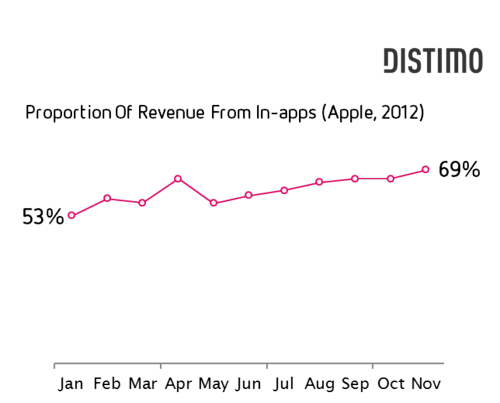MBA Mondays: Revenue Models - Mobile
The last two categories in the revenue model hackpad (mobile and gaming) are not really revenue models, they are sectors that have interesting revenue models worth discussing in this series. Today we will discuss mobile and next week we will discuss gaming.
Here is what we filled out for mobile in the revenue model hackpad:
Mobile offers revenue opportunities that the web does not for a few reasons. First, the downloadable app/app store model makes selling your software much easier on mobile than it is on the web. In 2012, almost $7bn of apps were sold in the iOS and Android app stores. Most of these purchases are being made as in app upgrades instead of initial purchases.
But as huge as app sales are, including in app purchases, I believe this will be the smallest of the big three mobile revenue models over time (app purchases, advertising, and transactions).
The mobile advertising market was estimated at around $3bn in 2012 but it is growing twice as fast as app purchases and is projected by Gartner to be over $20bn by 2015, a 90% annual compound growth rate (that compares to app purchases which are growing at about 30% per year).
I do not believe that we have yet cracked the code on mobile advertising. Mobile native approaches like Twitter's promoted tweets show the way. Interruption and "display" models aren't likely to work in mobile so we will need ad formats and solutions that are truly native in the mobile app and browser. The market is quickly innovating and I believe we will see a number of interesting models emerge this year which will cause the mobile ad market to grow quickly.
But as attractive as selling apps and running ads on them is, I believe the biggest and most attractive model in mobile is the transaction. Slowly but surely, our phone is becoming our wallet. And I don't mean wallet in the way that Google and PayPal think. I don't think we will necessarily have a mobile wallet. I think the apps on the phones will just have native transaction capability in them.
I have a friend who recently moved from NYC to SF and was back in NYC for a week of meetings. He told me he kept accidentally getting out of cabs without paying while he was in NYC. Using Uber in SF had trained him that once he had booked the ride on his phone, that was all he needed to do. Soon hopefully we will all be doing that with our Hailo app in NYC.
But that is just an example. Imagine if you could both checkin and checkout on your Foursquare app? Imagine if you could just walk into a movie or an airplane just using your phone (you can!). All of these things are possible without mobile wallets. The phone is our mobile wallet.
So I think transactions will be the biggest and most native form of monetization on mobile over time. That doesn't mean that you can't build a good business doing in app upgrades and mobile advertising. But it does mean that transactional networks on mobile is the biggest opportuntity in mobile that I see.
Next week, we will talk about gaming and then we will wrap this series on revenue models.






